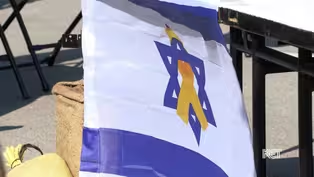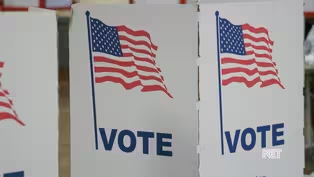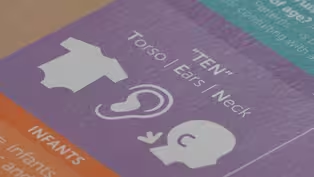
Kentucky Utility Workers Helping Out
Clip: Season 3 Episode 92 | 5m 15sVideo has Closed Captions
Many of Kentucky's utility workers have been deployed out-of-state to help areas hit by Helene.
As another major hurricane takes aim at Florida, many of Kentucky's electric and utility workers are out-of-state to help restore communities hit hardest by Hurricane Helene.
Problems playing video? | Closed Captioning Feedback
Problems playing video? | Closed Captioning Feedback
Kentucky Edition is a local public television program presented by KET

Kentucky Utility Workers Helping Out
Clip: Season 3 Episode 92 | 5m 15sVideo has Closed Captions
As another major hurricane takes aim at Florida, many of Kentucky's electric and utility workers are out-of-state to help restore communities hit hardest by Hurricane Helene.
Problems playing video? | Closed Captioning Feedback
How to Watch Kentucky Edition
Kentucky Edition is available to stream on pbs.org and the free PBS App, available on iPhone, Apple TV, Android TV, Android smartphones, Amazon Fire TV, Amazon Fire Tablet, Roku, Samsung Smart TV, and Vizio.
Providing Support for PBS.org
Learn Moreabout PBS online sponsorshipAnother major storm is headed for Florida.
This time it's Hurricane Milton, which today strengthened to a Category five storm.
It comes as cleanup continues from Hurricane Helene.
Many of Kentucky's electric and utility workers have been deployed out of state to help restore communities hit hardest by Helene.
Our Christy Dorton spoke to Joe Arnold from the Kentucky Electric Cooperatives about how these workers are responding to the calls for help.
Kentucky experienced its fair share of power outages, wind damage from the remnants of Helene.
But when Kentucky utility crews were done turning our power back on, the job was not done.
Isn't that right, Joe Arnold, tell us about this massive deployment of aid.
Yeah, as it turns out, this, we think, is the largest mass mutual aid deployment that Kentucky's electric cooperatives have ever done.
And there's been quite a few of, you know, with the hurricanes over the years.
But just the widespread nature of the damage across several states and several states that are very heavy with electric cooperatives, our sister co-ops North and South Carolina, Georgia in particular, and they're facing weeks long power restoration efforts with the help of, we believe, now more than 160 co-op personnel, employees of co-ops, in addition to hundreds of contractors those co-ops have released to go help with right of way work and things like that.
So where are the main states, the main places that they've been deployed to?
Well, all three of those states, North and South Carolina and Georgia, and each of them have really a very similar but at the same time, very unique challenges.
We certainly have seen a lot of the footage of the massive flooding in the landslides and such in North Carolina.
And we are in those areas as well.
Some areas are typical hurricane damage, tropical storm damage where the massive trees came down on top of power lines and snapped those those poles.
And as a result, it's not just a matter of stringing back lines.
It's also a matter of, in some cases, reconstructing the electric grid.
The other complication that we're seeing really like in North Carolina that I mentioned, when you look at some of the the the the landscape changing nature of this natural disaster, it's one thing to reconstruct an electric system where it has always been, if something else is to come across an area like this local call observer in those states and there and the land has changed.
The land may have been washed away.
So it has to be re-engineered before you can even put those poles back up.
You have to know where to put them.
And then finally and tragically, it's one thing to restore service, but if the homes are no longer there to what are you referring?
Restoring service.
And this sounds like a complicated, complex process.
How long are they expected to be there?
The crews when they left for is for those different states.
After they wrapped up mutual aid work within Kentucky here, they pretty much geared up to be gone for a couple of weeks.
It could be longer, but typically in past disasters, a mutual aid deployment after a couple of weeks, it's a good idea to rotate out, at least at that point.
You're working upwards of 15, 16 hour days.
You're getting, you know, 8 hours sleep and then you're right back at it the next morning.
And really, just from a safety standpoint, there's only so much so long.
You could do that over a long period of time.
And these are line workers and utility crews that mean so much to us and that we depend on here in Kentucky.
But doing this sort of work in these areas that have experienced disaster can actually benefit and they can bring some of that knowledge home.
Tell us about that.
Well, it's there's that's invaluable as far as the experience.
We do a lot of skills and training throughout the year, you know, throughout all of our call ups.
It's very important.
But in so you're actually on the ground in restoring power and and trying to access and cleared debris to get to a point where you can reconstruct the system.
You can't really replicate that training environment.
So really what we're seeing here it is I mean, frankly, some of the co-ops that are that we're helping have actually been in Kentucky and helping us after windstorms and ice storms here.
And our our crews have said that.
I mean, after spending a couple of weeks elsewhere after hurricane, they now have the hands on experience to be able to more quickly and efficiently and safely respond to disasters when they happen here at home.
Yes, we're giving help and sometimes we receive that help and we're grateful for it and we're grateful to help out.
Joe Arnold, thank you so much for your time.
Thanks, Christine.
And thank them both.
Kentucky Electric Cooperative says more than 160 utility workers from Kentucky are deployed, but there is still adequate staff in the state to respond to all local needs, including routine maintenance and emergencies.
500 troops from Kentucky's Fort Campbell are now helping Hurricane Helene victims in western North Carolina.
They're cleaning roads and moving food.
They're using, what, 600 or 60, rather, all terrain vehicles.
Those 500 troops are working with 500 more from Fort Liberty in North Carolina.
Jewish Leaders Mark Anniversary of Hamas Attack
Video has Closed Captions
Clip: S3 Ep92 | 3m 35s | Jewish leaders gathered in Louisville to mark one year since Hamas attacked Israel. (3m 35s)
Medical Cannabis Testing Facility
Video has Closed Captions
Clip: S3 Ep92 | 5m 4s | A look inside a testing lab that is the state's first to get a medical cannabis business license. (5m 4s)
Political Heavyweight Backs Big Ticket Ballot Item
Video has Closed Captions
Clip: S3 Ep92 | 3m 59s | Kentucky's big ticket ballot item is a constitutional amendment on school choice. (3m 59s)
Video has Closed Captions
Clip: S3 Ep92 | 2m 59s | The day promotes awareness of child abuse and child abuse prevention. (2m 59s)
This Week in Kentucky History (10/7/2024)
Video has Closed Captions
Clip: S3 Ep92 | 2m 8s | Toby Gibbs has a look at events that happened This Week in Kentucky History. (2m 8s)
Providing Support for PBS.org
Learn Moreabout PBS online sponsorship
- News and Public Affairs

Top journalists deliver compelling original analysis of the hour's headlines.

- News and Public Affairs

FRONTLINE is investigative journalism that questions, explains and changes our world.












Support for PBS provided by:
Kentucky Edition is a local public television program presented by KET




